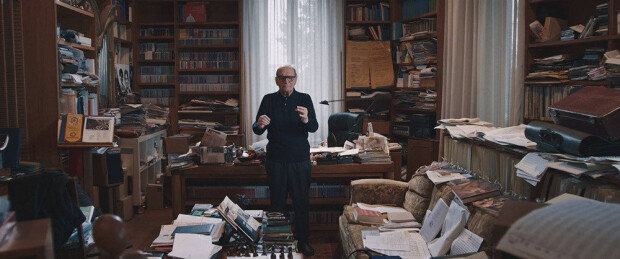A glimpse into the life of Ennio Morricone
A glimpse into the life of Ennio Morricone
Posted July. 04, 2023 07:56,
Updated July. 04, 2023 07:56

A white-haired old man sits in front of a blank music sheet in a dark room. With his hand on his forehead, the man carefully draws notes with his hand. There is no piano or guitar. Seated at his desk, he transfers the melodies playing in his head on the paper. At times he stared at the notes or flicked his hand in the air as if to conduct music or lay on the floor exercising as he thought. His friends described him as “an eccentric genius immersed in music, always in another world.”
The documentary of film music maestro Ennio Morricone (1928-2020) titled “Ennio: The Maestro” is scheduled to open on Wednesday. Well-known films with ear-catching music, such as “Once Upon in America (1984),” “Mission (1984),” and “Cinema Paradiso (1988)” always featured the maestro. The documentary was directed by Giuseppe Tornatore, the director of Cinema Paradiso. The two have been friends and colleagues since working together on Cinema Paradiso.
The movie reminiscences Morricone’s life from his childhood to moments of glory. Born in Rome, Italy in 1928, he was raised by his father, a trumpet performer. He wanted to become a doctor but had to play the trumpet to earn money.
“It was insulting to play to earn money,” he recalls. However, his outstanding talent led him to a new world. His teacher Goffredo Petrassi (1904-2003) spotted his talent and encouraged him to learn songwriting.
However, it was not easy to find a job. After graduating from the Conservatory of Santa Cecilia, he landed a job at a music label and started music arrangements. After working on his first film, “Facist,” directed by Luciano Salce (1922-1989) in 1961, he gained fame through “A Fist Full of Dollars” (1864). The theme song featured whistling in a captivating way, leaving many impressed.
The Italian composer shifted to film music and had been underestimated for quite a long time as he was not a traditional classical music composer. He was nominated for Best Music at the Academy Awards five times but did not get named. In 2016, he won the title at 88 after six tries and shed tears as he accepted the award.
Those who knew him recall that his songs are quite easy. The maestro did not think so, as he stared far away towards the end of the film, saying, “I was always in agony with the empty music sheet before me. I didn’t know what to look for but had to go on.”
Ji-Sun Choi aurinko@donga.com







